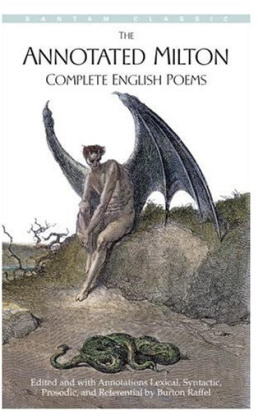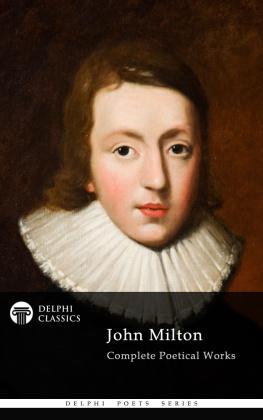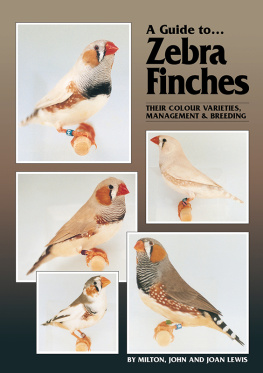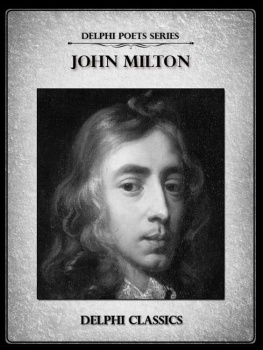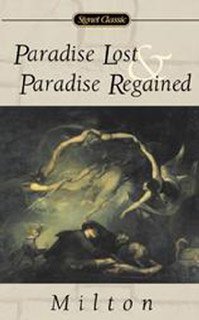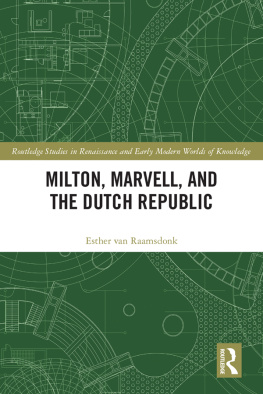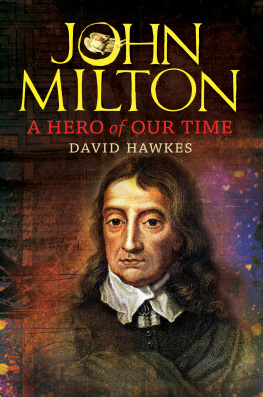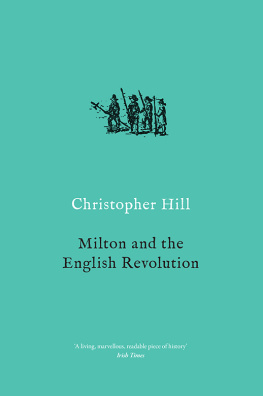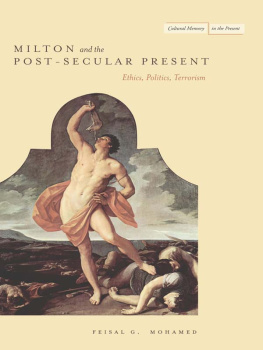John Milton - The Annotated Milton: Complete English Poems
Here you can read online John Milton - The Annotated Milton: Complete English Poems full text of the book (entire story) in english for free. Download pdf and epub, get meaning, cover and reviews about this ebook. year: 2008, publisher: Bantam Classics, genre: Science. Description of the work, (preface) as well as reviews are available. Best literature library LitArk.com created for fans of good reading and offers a wide selection of genres:
Romance novel
Science fiction
Adventure
Detective
Science
History
Home and family
Prose
Art
Politics
Computer
Non-fiction
Religion
Business
Children
Humor
Choose a favorite category and find really read worthwhile books. Enjoy immersion in the world of imagination, feel the emotions of the characters or learn something new for yourself, make an fascinating discovery.
- Book:The Annotated Milton: Complete English Poems
- Author:
- Publisher:Bantam Classics
- Genre:
- Year:2008
- Rating:4 / 5
- Favourites:Add to favourites
- Your mark:
- 80
- 1
- 2
- 3
- 4
- 5
The Annotated Milton: Complete English Poems: summary, description and annotation
We offer to read an annotation, description, summary or preface (depends on what the author of the book "The Annotated Milton: Complete English Poems" wrote himself). If you haven't found the necessary information about the book — write in the comments, we will try to find it.
The Annotated Milton: Complete English Poems — read online for free the complete book (whole text) full work
Below is the text of the book, divided by pages. System saving the place of the last page read, allows you to conveniently read the book "The Annotated Milton: Complete English Poems" online for free, without having to search again every time where you left off. Put a bookmark, and you can go to the page where you finished reading at any time.
Font size:
Interval:
Bookmark:

CONTENTS
CHRONOLOGY
1608 | Milton born, 9 December, in London |
1618?20? | tutored by Thomas Young |
1615? | |
1620?25 | St. Pauls School |
1625 | begins at Cambridge University, enrolled in Christs College |
1629 | March, B.A. degree |
1632 | March, M.A. degree |
163238 | residence at his fathers house |
1634 | September, Comus performed at Ludlow |
1637 | 3 April, death of Miltons mother |
163839 | European tour: France, Italy, Switzerland |
1640 | schoolteacher, in London |
1641 | Of Reformation in England Of Prelatical Episcopacy Animadversions upon the Remonstrants Defense |
1642 | May/June, married Mary Powell The Reason of Church Government An Apology for Smectymnuus October, Civil War begins |
1643 | The Doctrine and Discipline of Divorce April, Miltons father comes to live with him |
1644 | Of Education The Judgment of Martin Bucer Concerning Divorce Areopagitica Miltons sight begins to fail |
1645 | Tetrachordon Colasterion |
1646 | Poems 29 July, daughter Anne born |
1647 | March, death of Miltons father |
1648 | 25 October, daughter Mary born |
1649 | 30 January, Charles I executed The Tenure of Kings and Magistrates March, appointed Secretary for Foreign Tongues, Council of State |
1650 | left eye fails |
1651 | Defensio pro Populo Anglicano 16 March, son John born |
1652 | February/March, complete blindness 2 May, daughter Deborah born May, Mary Powell Miltons death 16 June, death of son, John |
1654 | Defensio Secunda |
1655 | Pro Se Defensio |
1656 | November, married Katherine Woodcock |
1657 | 19 October, daughter Katherine born |
1658 | February, death of Katherine Woodcock Milton 17 March, death of daughter Katherine 3 September, Oliver Cromwells death |
1659 | A Treatise of Civil Power in Ecclesiastical Causes |
Likeliest Means to Remove Hirelings out of the Church | |
1660 | The Ready and Easy Way to Establish a Free Commonwealth May, Charles II restored to the throne Milton arrested, released |
1663 | February, married Elizabeth Minshull |
1665 | resided at Chalfont St. Giles during plague |
1667 | February, ten-book edition of Paradise Lost |
1669 | Accidence Commenced Grammar |
1670 | History of Britain |
1671 | Paradise Regained and Samson Agonistes |
1672 | Joannis Miltoni Angli, Artis Logicae Plenior Institutio |
1673 | Minor Poems (enlarged edition) |
1674 | Paradise Lost, twelve-book edition 8 November, Miltons death, in London |
PREFACE
T HE FIRST version of what would become this book was written into the pages of another editors deservedly famous edition of Milton. Principally lexical and syntactic commentary, these early annotations stemmed directly from an extremely common quandary, namely, a teacher fundamentally (though by no means completely) dissatisfied with the textbook from which, for lack of anything better suited to his classroom, he goes on teaching. That sort of dissatisfaction can be lived with; it can finally be put to the side; or it can lead, as mine has, to a completely new book.
I teach Milton as an English poet, one of the very greatest, most influential, important, and deeply challenging the language has ever known. Although I firmly believe, like most scholars, that the more we know about any writer the more we can understand and also appreciate the resonating excellences and profundities of his or her work, I also believe that some of the things we can know are more useful than are others. Miltons English poetry seems to me so overwhelmingly primary to both appreciation and understanding of his place in English literature that his Latin poetry shrinks to tertiary significance, and his profusely vigorous prose to secondary significance. Accordingly, this edition of Milton contains none of the Latin (or the Italian) poems, either in the original language(s) or in translation. It contains none of Miltons prose.
The text of the English poems, however, is not only complete, but has been conservatively modernized and edited for maximum accessibility. Nothing has been done to interfere in any way whatever with the prosody of these poems. The vexing problem of syllabified versus unsyllabified vowels has been preempted by (1) the use of spelling to indicate each prosodically suppressed vowel (usually by means of an apostrophe, sometimes by such spellings as shouldst or didst), and (2) the addition of an accent mark each time a vowel is syllabified (wingd, blessd). My prosodic markings are consistent throughout this book. When, therefore, a word such as winged is mono-rather than bisyllabic, I have added neither an apostrophe nor an accent mark; the reader can assume that any word without one of those marks does not in my judgment require one.
Rather too much has been made of Miltons spelling, much of which is conventional and, though appropriate to his time, without significance in ours. His punctuation is in general (though not universally) a reliable guide to verse movement. I have punctuated, and capitalized, as conservatively as possible. But I have not hesitated to interpret Miltons use of semicolons and colons as requiring, in our time, a sentence-ending period. Nor have I hesitated to add reader-friendly paragraphing.
I would have been happier had my annotations been able to be placed alongside the line they refer to. The economics of publishing makes this impossible. But since I do not believe that lexical annotations consisting only of a single word are truly satisfactory, I have often given three or four or even more words in each gloss. Placing all annotations at the bottom of the page does, therefore, have at least the advantage of clearly separating annotations one from the other.
Most of my lexical annotations are to words rather than to phrases, clauses, or sentences. As a teacher, I have found that students need to know what the components mean, just as much as they need to know the meaning of the finished product. Indeed, understanding syntax becomes a good deal easier when the components are clearly understoodand many of my annotations are syntactic as well as lexical. All syntactic material is placed in square brackets: [verb]. If, as is usually the case, annotations are both lexical and syntactic, the lexical portion always precedes the syntactic.
Next pageFont size:
Interval:
Bookmark:
Similar books «The Annotated Milton: Complete English Poems»
Look at similar books to The Annotated Milton: Complete English Poems. We have selected literature similar in name and meaning in the hope of providing readers with more options to find new, interesting, not yet read works.
Discussion, reviews of the book The Annotated Milton: Complete English Poems and just readers' own opinions. Leave your comments, write what you think about the work, its meaning or the main characters. Specify what exactly you liked and what you didn't like, and why you think so.

